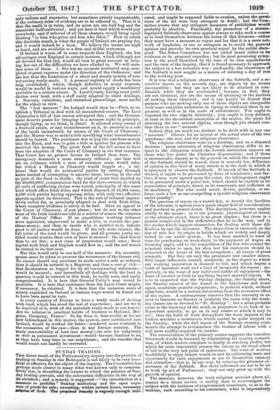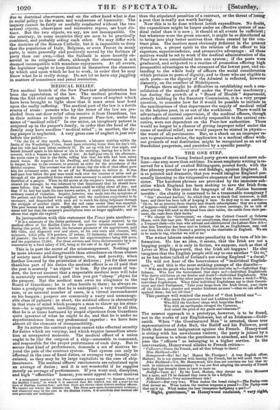SUNDAY TRADING.
THE direct result of the Parliamentary inquiry into the practice of trading on Sunday in the Metropolis is not likely to be very bene- ficial or effective for the object of the inquiry. The Committee has perhaps made clearer to many what was known only to compara- tively few, in describing the extent to which the practice of Sun- day trading prevails, and the.substantial difficulties in the way of its abolition; and a remedy is ouggested—" the introduction of a measure to prohibit" Sunday marketing and the open expo- sure of goods for sale; excepting, within certain hours, necessary articles of food. The proposed remedy ia vaguely enough indi- cated, and might be supposed liable to evasion, unless the provi- sions of the act were very stringent in detail ; but the Com- mime avows that any stringent measures of prohibition would probably be abortive. Practically, the promoters of a statute- regulated Sabbath-observance appear always to take such a course as to land themselves between the horns of this dilemma—either they must have a measure so vague and lax that it is a mere net- work of loopholes, or one so stringent as to revolt the general opinion and provoke its own practical repeal by the public disre- gard. The Select Committee has not added much either in its evidence or its proposed remedies ; but its most promising symp- tom is the proof furnished by the tone of its own appointment and the turn of the inquiry, that it is found necessary to approach the subject in a less sectarian way : professedly, the observance of the Sabbath is now sought as a means of securing a day of rest to the working poor. It is true that a religious observance of the Sabbath, and a re- creative repose on the seventh day, are objects by no means incompatible : hut they are not likely to be attained in com- bination while they are confounded ; because, in fact, they' are not identical, nor are the means of attaining or the motives of seeking them identical ; and it can hardly be denied that persons who are seeking only one of those objects are chargeable with some impolitic unfairness in trying to confound them in ar- emment as well as in the mode of enforcement. You ought to expound the two objects distinctly ; you ought to keep distinct, at least in the theoretical conception of the matter, the plans for attaining the two several objects, even though you should com- bine them in one "measure."
Indeed, they are much too distinct to be dealt with in any one "measure." Glance for an instant at the actual state of the two- questions—the rest, and the religious observance.
The religious observance rests on a doctrine, and on a disputed doctrine : pions advocates of religious observances differ in re- spect to the obligation which the Jewish institution imposes on those who live under the Christian dispensation ; and if there is interminable dispute as to the grounds on which the observance of the Sabbath should be rested, there is scarcely less difference of opinion in this land of many creeds as to the mode in which it is necessary to observe the Sabbath. If breach of the Sabbath. is. wicked, it ought to be prevented by force of conscience ; and fur- ther, if men were agreed upon the point, the infringement ought to be prevented under a penal law, which should be explicit in its enunciation of principle, direct in its enactment, and sufficient in its machinery. But who could assert, devise proclaim, or en- force, such a law as one compelling a specific religious observance under penalty? The question of repose on a stated day, to recruit the faculties of the labourer, is spread over a much larger field of consideration, and involved in greater doubt. This description, however, applies chiefly to the means : as to the grounds' physiological or moral, or the ultimate object, there is no great dispute ; but there is a painful complexity in the difficulties that lie in the way, and in the modes which suggest themselves for dealing with those dif- ficulties by specific measures. The disposition to encroach on the day of rest has its origin in habits which are widely and deeply rooted in our social system. It has been ascribed to want of time for purchasing on week-days, to the payment of wages on Saturday night, and to the competition of the few who compel the reluctant trader to open his shop lest his customers should be attracted to the house of the less scrupulous ; all causes of great strength. But they are only the proximate and smaller causes. Still larger influences consist, positively, in the degree to which our working population is doomed to toil, and which begets a habit of incessant work and a kind of incapacity for repose ; ne- gatively, in the want of any cultivated habits of enjoyment—the want of interest or faith in anything beyond material objects. It is to be suspected that the Sunday shopping, the Sunday shave, the Sunday mission of the dinner to the bakehouse and home again, constitute positive enjoyments; to prohibit which, without substitute, would be a serious defalcation from the recreative effect of the repose. A contemporary observes that the necessity to at- tend to business on Sunday is probably the cause why the work- ing classes are so devoted to " St. Monday": but a more probable cause is the tendency of the mind, in proportion to its lack of in- dependent activity, to go on in any course to which it may be set ; thus the habit of work throughout the week imparts to the human machine a momentum which cannot be quite stopped on the Sunday, while the dull repose of the Sunday evening coun- teracts the attempt to recommence the routine of labour with a still more readily-acquired via inertite. The consideration of the primary causes suggests the remedies. Overwork would be lessened by diminishing the trading competi- tion, of which traders complain so loudly as crushing profits, but which far more lamentably presses the labour up the tread-wheel of toil to the very last point of endurance. The want of motives healthfully to enjoy leisure would be met by cultivating taste and opportunity for such enjoyments as are in themselves salutary and attractive—that is, in one way, by relaxing the gloomier ob- servance of the Sabbath. But these influences are not to be set to work by act of Parliament; they can only grow up with the growth of opinion. The moralist, however, the truly religious moralist above all, cannot do a better service to society than to reinvestigate the .subject with the boldness of singleminded conscience, so as to de- termine, each according to his conviction, what is imperatively due to doctrinal observance, and on the other hand what is due in social policy to the wants and weaknesses of humanity. The inquiry cannot be fairly or usefully conducted without the two several objects, observance and recreative repose, are kept dis- tinct. But the two objects, we say, are not incompatible. On the contrary, in some countries they are seen to be practically combined, and probably aiding each other. We may differ with the doctrine of the Roman Catholic, but it is impossible to deny that the population of Italy, Belgium, or even France in many parts, is more generally and positively moved by the feelings of piety than our own,—that the Sabbath is more heartily ob- served in its religious offices, although the observance is not deemed incompatible with mundane enjoyments. At all events, the legislator ought to keep distinct in themselves the elements by which and upon which be has to work, in order that he may know what he is really doing. Do not let us have any juggling in matters of conscience and penal restriction.

























 Previous page
Previous page